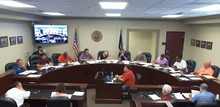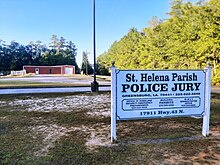
In the U.S. state of Louisiana, the most common type of governing body for a parish is the police jury ( French: le jury de police). Louisiana is divided into parishes for units of local government, similar to the counties in other states. Initially, all parishes used the police jury system. Many have transitioned to other forms of government, especially after the 1974 state constitution granted the parishes more autonomy. In general, the more rural areas still use this older system.
The police jury is a legislative and executive body. Parishes are divided into wards or districts. These each elect a "juror" to the assembly. The jurors elect a police jury president as their chairman. The president presides over the police jury and serves as the titular head of the parish government. Police juries range in size, depending on population, from three to over fifteen members. Wide latitude is given to organize and administer parish business.
Etymology
A police jury was called a "police assembly" initially. A law passed on April 6, 1807, created groups to handle the "local police and administration of their parish". [1] Three years later, these were officially defined as "police juries" and given specific roles. [2] The term "jury" comes from the two aspects of the original police juries. They were the same size as grand juries and were presided over by the parish judge. [1]
History
The police jury system was introduced when the area was the Territory of Orleans. Two years after the Louisiana Purchase, [3] the newly formed legislative council divided the territory into 12 counties. These counties proved unmanageable, and the legislature reverted to using the smaller Catholic parishes, defined in 1762 as "the farthest area that the priest could ride on horseback, within reason, to go to the outlying churches to conduct a mass once a month". [2]
In 1810, the office of sheriff was created for each parish, and the police jury was officially defined one year later. [2] The original format had the parish judge presiding over the police jury, but this was quickly replaced with a police jury president, elected by the jurors from among their members. [4] In 1813, the parishes were subdivided into wards, each electing one juror. [2]
The Territory of Orleans had a different cultural background than other states and no experience with representative government. [3] The juries started with limited powers and an explicit mandate to maintain and regulate infrastructure, alcohol consumption, and slavery. [4] [1] Their role would grow to encompass over fifty government functions. [3] The 1974 State Constitution granted more autonomy to cities and parishes. This shifted from delegated authority where parishes could only do what was explicitly permitted, to " home rule" where the local government could do anything not explicitly prohibited. [5] Many parishes chose to transition away and drafted home rule charters, defining the structure, powers, and limits of their local government. [5]
Functions

In Louisiana, the level of government between the city and state is the parish, comparable to the counties used by other US states. [3] The police jury handles the executive and legislative functions of the parish government. The parishes are divided into wards or districts. These each elect a "juror" to the assembly. [5] The assembly's size varies depending on the population, from three members in some rural parishes to over fifteen. The jurors elect a "police jury president" from among their members. [4] Like other elections in Louisiana, parish elections typically occur in odd-numbered years and use the open primary system. [4]

While originally narrow in scope and only holding powers delegated by the state, modern police juries have broad authority to take actions approved by the voters. According to the Police Jury Association of Louisiana, responsibilities include road maintenance, construction of prisons, waste disposal, bridge construction, fire protection, maintaining the courts plus other parish offices, promoting tourism, and regulating local businesses. They can also create ordinances and enforce them via fines in civil court. [4] To receive state funding, police juries are required to assign road maintenance to a centralized program to prevent conflicts of interest. [5] Police juries also administer state and federal programs at the local level. [3]
Forms of parish government

The police jury is the most common form of parish government in Louisiana. [6] Many parishes, especially those with large municipalities and suburban areas, have converted away from the system. [4] Twenty-six Louisiana parishes are governed by home rule charters that allow them to pick a different form of government. [6] These include council-president, council-manager, and consolidated parish/city. [4] Under a council-president system, voters elect an executive president and a legislative council separately. With the council-manager system, voters elect a parish council, which hires a professional manager to run the day-to-day government. A consolidated government combines the parish with the local city government, and voters typically elect a separate council and executive. [5] For example, since 1949 the state's capital city and its containing parish have used a consolidated government headed by a mayor-president. [7] [8]
| Parish | Type of government |
|---|---|
| Acadia | police jury |
| Allen | police jury |
| Assumption | police jury |
| Avoyelles | police jury |
| Beauregard | police jury |
| Bienville | police jury |
| Bossier | police jury |
| Calcasieu | police jury |
| Caldwell | police jury |
| Cameron | police jury |
| Catahoula | police jury |
| Claiborne | police jury |
| Concordia | police jury |
| DeSoto | police jury |
| East Carroll | police jury |
| East Feliciana | police jury |
| Evangeline | police jury |
| Franklin | police jury |
| Grant | police jury |
| Jackson | police jury |
| Jefferson Davis | police jury |
| La Salle | police jury |
| Lincoln | police jury |
| Madison | police jury |
| Morehouse | police jury |
| Ouachita | police jury |
| Rapides | police jury |
| Red River | police jury |
| Richland | police jury |
| Sabine | police jury |
| St. Helena | police jury |
| Tensas | police jury |
| Union | police jury |
| Vermillion | police jury |
| Vernon | police jury |
| Webster | police jury |
| West Carroll | police jury |
| Winn | police jury |
| Ascension | council-president |
| Iberia | council-president |
| Iberville | council-president |
| Jefferson | council-president |
| Lafourche | council-president |
| Livingston | council-president |
| Natchitoches | council-president |
| Plaquemines | council-president |
| Pointe Coupee | council-president |
| St. Bernard | council-president |
| St. Charles | council-president |
| St. James | council-president |
| St. John the Baptist | council-president |
| St. Landry | council-president |
| St. Martin | council-president |
| St. Mary | council-president |
| St. Tammany | council-president |
| Tangipahoa | council-president |
| Washington | council-president |
| West Baton Rouge | council-president |
| West Feliciana | council-president |
| Orleans Parish & New Orleans | consolidated |
| East Baton Rouge Parish & Baton Rouge | consolidated |
| Lafayette Parish & Lafayette | consolidated |
| Terrebonne Parish & Houma | consolidated |
| Caddo Parish | council manager |
See also
References
- ^ a b c Calhoun, Robert Dabney (January 1935). Walter Prichard (ed.). "The Origins of County–Parish Government". The Louisiana Historical Quarterly (1969 AMS reprint ed.). Vol. 18, no. 1. pp. 93, 94, 120.
- ^ a b c d KPLC (21 June 2007). "History of Police Jury Government". 7KPLC News. Lake Charles, Louisiana: KPLC.
- ^ a b c d e Bourgeois, Andreé; Pino, Jennifer; and Laver, Tara (2005–2008). "Biographical/Historical Note". W.P.A. Collection Historical Records Survey Transcriptions of Louisiana Police Jury Records. Baton Rouge, Louisiana: LSU Libraries.
- ^ a b c d e f g h Ouchley, Kelley (15 June 2021). "Police Juries". 64 Parishes. New Orleans: Louisiana Endowment for the Humanities.
- ^ a b c d e f Hancock, Harry J, ed. (1998). "Your Local Government." Your Louisiana Government: An Owner’s Manual. Baton Rouge: Public Affairs Research Council of Louisiana, 1998. Ch. 6, pp. 73–82.
- ^ a b c McCreary St. Romain, Sunny, ed. (2019). "Parish Government Structure". Police Jury Association of Louisiana. Retrieved 11 October 2023. Archived 11 October 2023.
- ^ Higginbotham Makes History As First Mayor-President. 1 January 1949. Baton Rouge State-Times. § B, p. 25.
- ^ "200 Years of Baton Rouge History: An Interactive Timeline". 2017. Baton Rouge 200. East Baton Rouge Parish Library. § 1949.